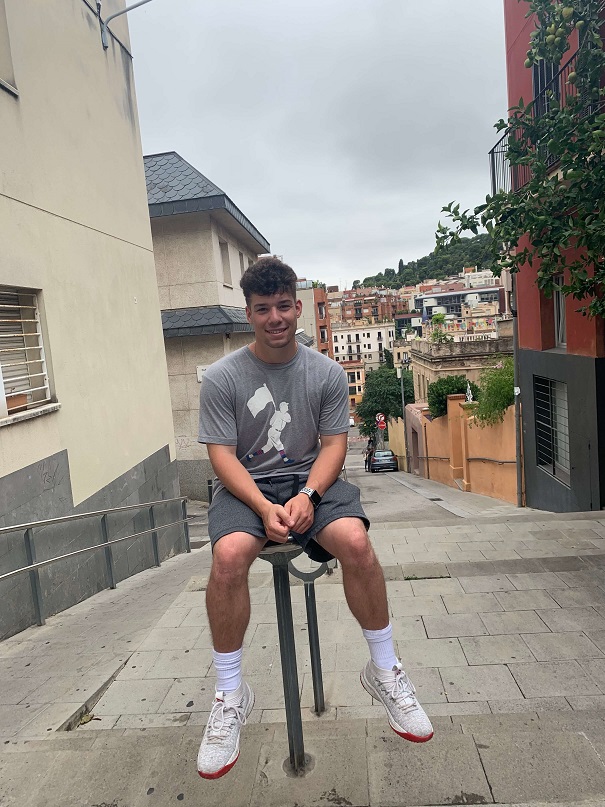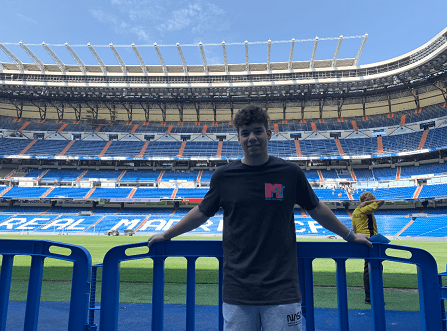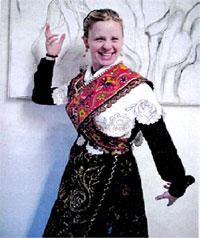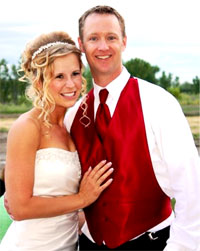Student Testimonials for Letra Hispánica
Sam Muskat
Age (while abroad): 21 
Degree(s): Spanish/Political Science/Sociology
Where did you go?: Salamanca, Spain
In what school did you study?: Letra Hispánica
When did you go?: June 11-August 18 2019
Have you studied abroad before?: No
What was your prior language knowledge?: I had taken Spanish courses since 1st grade.
Why did you do study abroad?: I wanted to do study abroad so I could have an extended period of time to use my Spanish as well as completing credits for my Spanish major.
Would you do this again?: Yes
What was your favorite part?: My favorite part was that I was able to speak my second language for the most extended amount of time in my life.
What was your least favorite part?: My least favorite part would be the occasional difficulty to keep up with news and current events taking place in my home country.
How has study abroad affected your life now?:
I am certainly much more cognizant of when I speak in English, I have become much
more aware of what I say, when I say it, and how I say something. Perhaps this is
simply the norm when returning to speaking my native language after an extended break
from speaking it but I am nonetheless much more acutely aware of basically everything
I say in English.

I learned, more or less, how to live my life without a sport. Since my youth I have
always been playing sports and sports has been always a presence in my life. After
school practices, games etc. have been something that I have always had ever since
I started school. During study abroad I learned how to fill my time with new hobbies
and activities outside of sports, which will be an incredibly useful skill when I
am finished playing baseball here at MSUB.
What advice you would offer students interested in studying abroad?:
I would certainly recommend spending time abroad with family beforehand, if possible,
before doing a study abroad. Living in a completely different continent is certainly
a culture change so I would highly recommend having some amount of experience before
living abroad on one’s own for an extended period of time.
Courtney Hill
Age (when abroad): 21
Degrees: Elementary Education & Secondary Spanish
Prior Language Knowledge: 2 years in high school and 2 years at MSUB
Where did you go? Salamanica, Spain - Letra Hispánica
When did you go? December 2002 - June 2003
Have you studied abroad before?
No. Mrs. Hill did briefly visit Australia with Northwest Basketball Camp for two
weeks and she traveled to Mexico for a month with Oral Roberts University.
Why did you do study abroad?
"I went abroad for two reasons: 1) because I loved traveling and seeing the world; and 2) because if my Spanish was going to be good
or if I ever wanted to teach it, I knew I had to immerse myself in the culture and
be somewhere. Otherwise, I would have had only my "American Spanish" which was not
phenomenal."
Would you do it again?
Mrs. Hill felt at times that that she was inundated by the Spanish culture. It was
"full-time" Spanish for her. Mrs. Hill grew to love the complete immersion.
What was your favorite part?
"My favorite part was also the hardest part." For Mrs. Hill to be completely surrounded
by Spanish and "in" their culture was what she enjoyed the most. She also enjoyed
the weekend excursions around Spain that the school arranged for the internationals.;
"They were a lot of fun. It really opened up my eyes to another culture and world."
Mrs. Hill also told me how she enjoyed the Siestas. "It was a real fun part--I loved
it! Work isn't as important there. It is more important to take a break in the middle
of the day and to be with the family. Also, the evenings are all about being with
the family, walking and the night life. At 10:00/10:30 everyone is in the streets.
They are out eating tapas, sipping a glass of wine or just enjoying everyone's company."
What was the easiest aspect of your study abroad?
"There was not a lot that was easy; it was a very challenging time for me. Although
having Christal there, another MSUB student, was really beneficial. I was able to
relate to her in English and we became friends."
 What was the hardest challenge you faced?
What was the hardest challenge you faced?
"Definitely being submersed into the Spanish culture, and the shock of the speed
and fluency of the native speakers." Mrs. Hill told me how it was difficult "just
trying to demonstrate your personality when you can't communicate. "It's so hard.
I experienced extreme frustration, especially at the beginning when I wanted to learn
so bad, and I knew I was missing 90% of what was going on."
How has this study abroad affected your life now?
"It has bettered my Spanish and broadened my worldview. I now have a lot of perspective
about how other people live--it's not just the 'American Way.' I also consider it
another battle that I have conquered." Additionally, Mrs. Hill told me about how her
Spanish education has been integrated into her classroom. "I teach my elementary students
Spanish in mini-classes but so much of it is incorporated into the everyday activity.
For example, my salutations each day are in Spanish. Also, my students are divided
into pods and their group has a color name which is how they are summoned, in Spanish.
At the end of the year the students tell me that incorporation of the language was
their favorite part, and they tell me that it is the reason they wanted to be in my
class."
What advice/words of wisdom would you offer students interested in studying abroad?
"Definitely go! It will grow you so much in so many ways. It will further your language
and broaden your horizons. Be patient, though, immersion takes awhile to get used
to. Also, do as much as you can. Instead of being in the book so much or so long,
go meet the people there. I wish I would have been around more Spaniards. When you
do this, then you really get the meat of the experience. Also, a host family is a
must."
